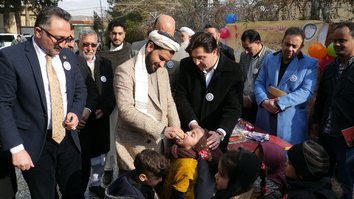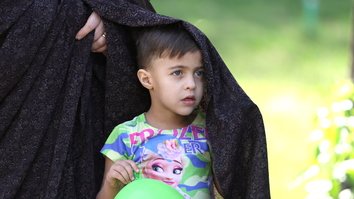KUNDUZ -- The Taliban's efforts to halt polio vaccination efforts in Baghlan Province resulted in a new case of the affliction late last year, health officials say.
Afghanistan, one of only three countries where polio remains endemic, had 29 cases of it in 2019. The other two countries are Pakistan and Nigeria.
The Baghlan Department of Public Health last fall launched a door-to-door vaccination drive for the entire province, but the campaign was thwarted by the militant outfit, said Dr. Muhebullah Habib, director of the department.
The vaccination campaign was aimed at inoculating 300,000 children under the age of five, with mobile teams set to enter areas under the Taliban's control, he added.
![In this photo taken last March 20, Afghan health workers along with polio immunisation team members arrive at a house during a vaccination campaign in Arghandab District, Kandahar Province. [JAVED TANVEER/AFP]](/cnmi_st/images/2020/01/28/22172-000_1he0a4-585_329.jpg)
In this photo taken last March 20, Afghan health workers along with polio immunisation team members arrive at a house during a vaccination campaign in Arghandab District, Kandahar Province. [JAVED TANVEER/AFP]
"As the Taliban prevented the mobile vaccination teams [from entering certain areas], a positive polio case was recorded on November 14, 2019, in Mangalha village of the Dand-e-Ghori area, which is on the outskirts of Pul-i-Khumri city," Habib said. Baghlan health officials recently confirmed the case.
"A four-year-old child, Zabihullah, has contracted the virus," he said, adding that an assessment by the World Health Organization (WHO) shows that the virus "is of a Pakistani type".
While health officials, with the help of tribal elders, asked the Taliban several times to allow mobile vaccination teams to operate in areas under their control, the group refused, Habib said.
"The WHO, the Ministry of Public Health and all our partners are seriously concerned about the situation," he said. "If the Taliban continue to create obstacles, they're committing a big crime."
Habib called on the Taliban to stop preventing the delivery of health services and allow the eradication of polio in the country.
"If my child Zabihullah had taken all his vaccines, he wouldn't have contracted the virus," said Sayed Akbar, father of the child who contracted the polio virus and a resident of Mangalha village in the Dand-e-Ghori area.
"I am not sure why it happened," he said. "I had completed all the vaccination rounds for my child except one or two of them. If he had taken those, he wouldn't have caught this disease."
"One side of my child's body has weakened, and when the doctor saw him, he said he had contracted polio, which made me very upset," he added.
"It is very painful for me to see my son get sicker and sicker, and I can't do anything for him," he said.
The child's father said he has lived in the area for 40 years and has never travelled abroad.
He called on the Taliban to have mercy on children and stop preventing polio vaccinations.
Preventing door-to-door campaigns
Residents of Baghlan consider these acts by the Taliban crimes against children.
"Three months ago, we went twice to areas under the Taliban's control and gave them the messages from the health workers to stop creating obstacles for vaccination drives," said Abdul Halim Sabaat, 53, a tribal elder in Baghlan Province.
"The Taliban told us that the vaccines need to be made available in [health] clinics, and residents have to take their children to those clinics for vaccination," he added. "They said they don't allow door-to-door campaigns."
If health workers do not run door-to-door campaigns, families will miss out on vaccinations because they will not take their children to remote clinics, Sabaat said, referring both to parental apathy and to lack of transportation.
Safdar Mohseni, chairman of the Baghlan provincial council, lamented the efforts by the Taliban to prevent children's vaccinations.
"It is unfortunate that one of our children became paralysed because an illegal group prevented his vaccination. It is a disaster for our children," he said.
"When a case emerges in one location, it spreads to other areas, and it is a matter of concern," he said.
"The Department of Public Health shared its concern with us, but the Taliban rejected our request and didn't allow the vaccination team to give vaccines to children under the age of five," he said.
The Baghlan-e-Markazi, Tala Wa Barfak and Burka districts as well as the areas of Dand-e-Shahabuddin, Dand-e-Ghori and Kailagi are considered insecure regions in Baghlan where children have been deprived of vaccines, he said.
"Among districts with a population of more than 50,000 people, 20% are children," Mohseni said.
Efforts to contain polio
The village where the polio case occurred has been quarantined with the help of local elders, said Habib, the public health director.
That measure should curb the spread of the virus to other areas, he said.
"We can't cure this child, but we have imposed an emergency and isolated the area where the child lives," Habib said.
"Our health team is looking to find out how the virus reached Baghlan and what caused the transmission," Habib added.
While he didn't provide the number of children deprived of the polio vaccination in insecure areas, Habib said the department has planned preventive measures.
"I call on religious scholars, imams of mosques, elders and local leaders to provide awareness to people in their areas," said Abdul Qadim Niazi, the acting governor of Baghlan.
"The governor's office has given an order to the Baghlan Department of Public Health to curb the spread of the virus to other parts of Baghlan Province as well as neighbouring provinces by taking preventive measures," he said.
"Polio vaccines have been administered through door-to-door campaign in areas under the government's control, but the campaign has been facing challenges in areas that are under the Taliban's control," he added.
Soon military operations will begin against the Taliban in insecure areas of Baghlan, and when the vulnerable areas are cleared of the militants civilians will gain access to all government services, he said.

![Baghlan Acting Governor Abdul Qadim Niazi administers the polio vaccine to a child on the first day of a vaccination campaign in Pul-i-Khumri, Baghlan Province, last November 11. [Baghlan Governor's Office]](/cnmi_st/images/2020/01/28/22168-baghlan-2-585_329.jpg)







Dear brother, the Taliban do not do this themselves. They are told by Pakistan to do it so that Afghanistan will have disabled citizens.
Reply2 Comment
I wonder why the Taliban don't allow vaccinations in the areas under their control?
Reply2 Comment